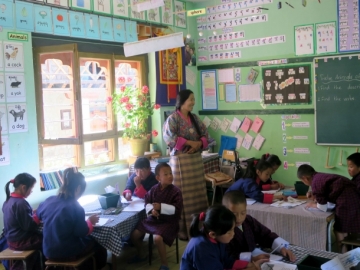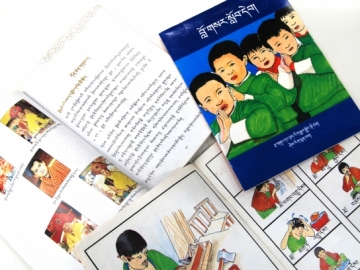Difficulties reading and writing the national language
Fri, Mar 3, 2017-
Tags
Passing time in Bhutan (Part 2)
Assistant Professor Takehiro Hirayama
The Hirayama Ikuo Volunteer Center (WAVOC)
*Note: Dzongkha is the official language of Bhutan used mainly in the country’s western region. Hindi is the official language of India, but it was previously used in Bhutanese classrooms.

Elementary school students studying Dzongkha
Bhutan is a multilingual country where approximately 20 languages are commonly spoken. There is no absolute majority, and Dzongkha, Bhutan’s official language, is only spoken by 30% of its population, and people from each region have their own native language. Even the 30% of the people who speak Dzongkha as their mother tongue have difficulties reading and writing it. Only a handful of Bhutanese read and write Dzongkha on a daily basis. Newspapers written in Dzongkha are almost never read, and books written in the language are not even published. Dzongkha Facebook users are 1 out of 10,000.
What languages do Bhutanese people use on a daily basis then? The answer is English. With aims to nationally expand schools in quantity, most subjects have been taught in English ever since it switched over from Hindi more than 50 years ago. Although Dzongkha is taught using a textbook written in Dzongkha, subjects such as math, biology, chemistry, history and geography are all taught in English with English textbooks. From elementary school to university, classes are conducted in English. “Fostering citizens who can adapt to internationalization” is said to be the reason, but behind this light is the fact that teaching various subjects in Dzongkha was just not possible simply because the lack of equivalent vocabulary words.
Due to such educational influences in schools, most literate Bhutanese adults (55% according to recent statistics*) aside from monks tend to say, “I have to admit, I am better at reading and writing English than the official language!”

Dzongkha textbooks for elementary school children
Dzongkha was selected under the “vulnerable” category as one of the approximately 2,500 languages listed on the endangered languages list compiled by UNESCO in 2009. The government is making efforts for the widespread use of Dzongkha to protect and promote its culture for the national development plan, but unfortunately, it does not seem to be bearing fruit.
The problem is that English would better serve the convenience in society as opposed to Dzongkha in Bhutan today. Currently in the Bhutanese social system, being able to speak Dzongkha does not necessarily equate to having good employment prospects. English is essential in white-collar office work but Dzongkha is not required. Some of the rare professions requiring accuracy in Dzongkha are: government officials, anchors for Dzongkha television, editors for Dzongkha newspapers and scriptwriters.
Still, language is close at heart to the lives of its people. Perhaps, new discoveries about a country or a region may lie ahead by studying its language.
*Policy and Planning Division, Ministry of Education (MoE) (2015) Annual Education Statistics, 2015, Thimphu: MoE, p.5.














